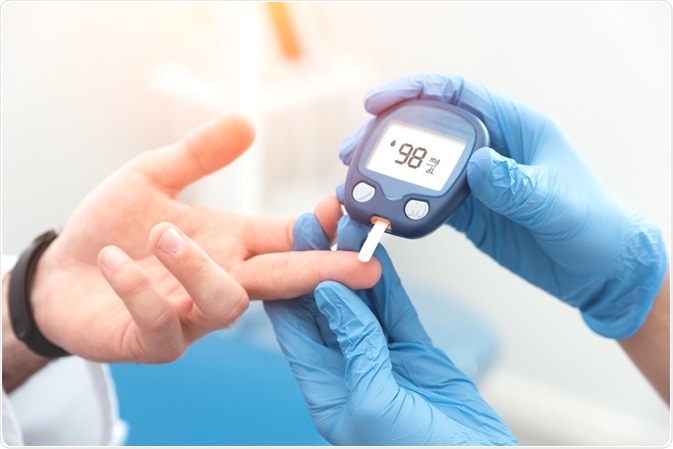Research published in the Journal of Gerontology Series A has shown that blueberries may have beneficial effects on cardiovascular health.
.jpg)
Image Credit: Subbotina Anna/Shutterstock.com
The team of researchers from King's College London found that consuming 200 g of blueberries every day for four weeks led to decreased systolic blood pressure and improved blood vessel function in 40 healthy volunteers.
As part of the study, the participants were divided into two groups. One group was given a blueberry-based drink while the other group was given a matched alternative to consume.
The researchers then analyzed the participant's urine and blood alongside measurements of their blood pressure and the flow-mediated dilation (FMD) of the brachial artery.
FMD aims to measure how much the artery widens as the amount of blood flow increases which is an accurate biomarker of an individual's risk of cardiovascular disease.
In a follow-up study, the team investigated the effects of the blueberry juice compared to a similar drink containing purified anthocyanin – a phytochemical that produces the purple, pink, blue, and red coloring of fruit and vegetables such as red grapes and berries.
The effects of both drinks were also compared against a control solution containing matched levels of vitamins, fiber, or minerals to those typically found in blueberries.
Results
After analyzing the results, the researchers found several notable effects. Firstly, the improved blood vessel function was observed in the two hours following the consumption of the blueberry drink and remained for four weeks even after a period of overnight fasting.
Over the four weeks, the participants in the blueberry drink condition were observed to have a reduced blood pressure reading by 5mmHg. These results matched those commonly seen in studies investigating the effects of blood pressure-lowering medication.
In the follow-up study, those who consumed drinks containing purified anthocyanins were noted to have improved endothelial cell function. Endothelial cells act as a barrier between the lymph or blood and the surrounding body tissue in addition to playing a vital role in blood pressure regulation and clotting.
The control drinks and those with matched minerals, fiber, and vitamins were not found to have significant effects on FMD two and six hours after drinking.
Research Implications
One of the lead researchers, Dr. Ana Rodriguez-Mateos from the Department of Nutritional Sciences at King's College London said: "Although it is best to eat the whole blueberry to get the full benefit, our study finds that the majority of the effects can be explained by anthocyanins".
Based on this, she further argued that if the changes seen in this study could be sustained for a person's life, "it could reduce their risk of developing cardiovascular disease by up to 20%."
Health Benefits of Blueberries
The results found in this study align with the literature of research demonstrating the positive health benefits of regular blueberry consumption.
For example, it has been found that blueberries reduce the risk and biomarkers of cardiovascular disease, neurological degeneration, and type two diabetes, to name a few.
Diabetes
Those with type 2 diabetes and prediabetes who consumed blueberries were found to have a reduced risk of type 2 diabetes by 26%. Similar research found that obese diabetic adults showed increased insulin sensitivity following a 6-week intake of blueberries.

Image Credit: Proxima Studio/Shutterstock.com
Mental health
Research has found that older adults who consumed more blueberries and strawberries showed a reduced risk of cognitive decline, compared to those who consumed fewer amounts of fruits.
Complementary research found that older adults who consumed blueberries daily for 12 weeks showed improved cognitive function.
Obesity
Being overweight or obese is considered to be a significant risk factor for developing cardiovascular disease. In a study comparing the effects of 16 types of fruits on weight gain, blueberry intake was found to be linked to the least weight gain.
Similarly, twin study research has shown that the twin who had a higher consumption of blueberries also had a lower fat-mass ratio compared to their sibling.
Sources
- Kalt, W., et al. (2019). Recent Research on the Health Benefits of Blueberries and Their Anthocyanins. Advances in Nutrition. Doi: https://doi.org/10.1093/advances/nmz065
- Rodriguez-Mateos, A., Istas, G., Boschek, L., Feliciano, R.P., Mills, C.E., Boby, C., Gomez-Alonso, S., Milenkovic, D. and Heiss, C., 2019. Circulating anthocyanin metabolites mediate vascular benefits of blueberries: insights from randomized controlled trials, metabolomics, and nutrigenomics. The Journals of Gerontology: Series A, 74(7), pp.967-976.
- Gregg, E.W., Cheng, Y.J., Cadwell, B.L., Imperatore, G., Williams, D.E., Flegal, K.M., Narayan, K.V. and Williamson, D.F., 2005. Secular trends in cardiovascular disease risk factors according to body mass index in US adults. Jama, 293(15), pp.1868-1874.
- Bertoia, M.L., Mukamal, K.J., Cahill, L.E., Hou, T., Ludwig, D.S., Mozaffarian, D., Willett, W.C., Hu, F.B. and Rimm, E.B., 2015. Changes in intake of fruits and vegetables and weight change in United States men and women followed for up to 24 years: analysis from three prospective cohort studies. PLoS medicine, 12(9).
- Jennings, A., MacGregor, A., Spector, T. and Cassidy, A., 2017. Higher dietary flavonoid intakes are associated with lower objectively measured body composition in women: evidence from discordant monozygotic twins. The American journal of clinical nutrition, 105(3), pp.626-634.
- Muraki, I., Imamura, F., Manson, J.E., Hu, F.B., Willett, W.C., van Dam, R.M. and Sun, Q., 2013. Fruit consumption and risk of type 2 diabetes: results from three prospective longitudinal cohort studies. Bmj, 347, p.f5001
- Stull, A.J., Cash, K.C., Johnson, W.D., Champagne, C.M. and Cefalu, W.T., 2010. Bioactives in blueberries improve insulin sensitivity in obese, insulin-resistant men and women. The Journal of nutrition, 140(10), pp.1764-1768.
- Devore, E.E., Kang, J.H., Breteler, M.M. and Grodstein, F., 2012. Dietary intakes of berries and flavonoids in relation to cognitive decline. Annals of neurology, 72(1), pp.135-143.
- Krikorian, R., Shidler, M.D., Nash, T.A., Kalt, W., Vinqvist-Tymchuk, M.R., Shukitt-Hale, B. and Joseph, J.A., 2010. Blueberry supplementation improves memory in older adults. Journal of agricultural and food chemistry, 58(7), pp.3996-4000.
Further Reading
Last Updated: Apr 14, 2020